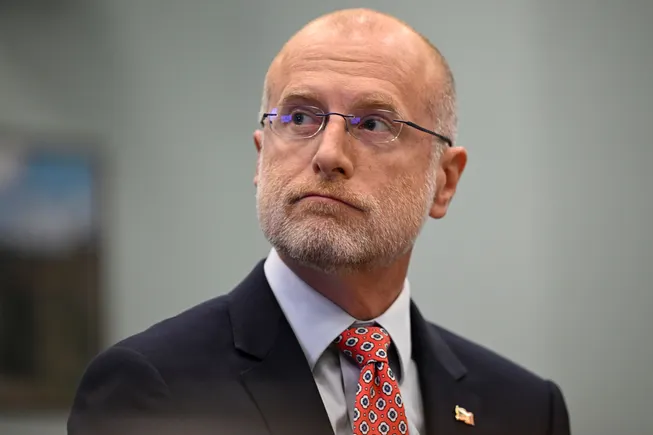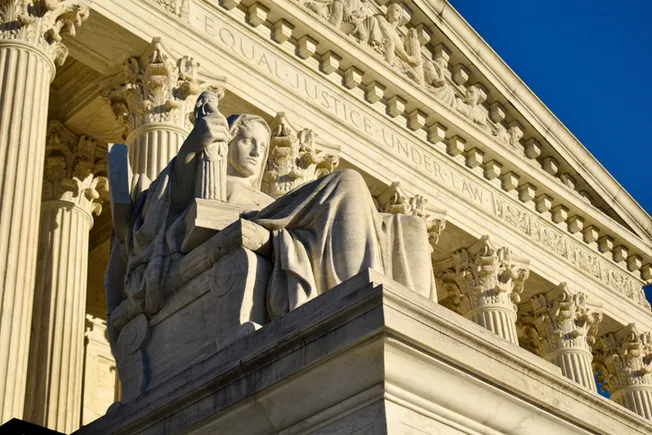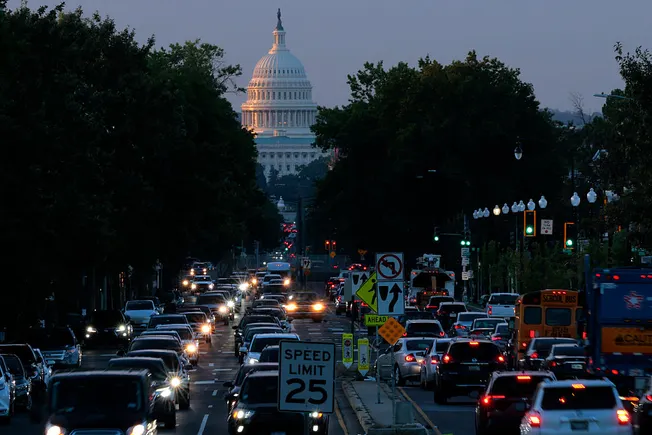We’re rounding up last week’s news, from the government shutdown’s impact on schools to differentiated teacher compensation.
Tag: Erate
-

FCC proposal would disconnect school bus Wi-Fi, hotspots from E-rate coverage
This audio is auto-generated. Please let us know if you have feedback.Dive Brief:
- An E-rate expansion that allowed schools to use the program’s funds for school bus Wi-Fi and hotspots for students could soon be reversed, pending a vote called for by Federal Communications Commission Chairman Brendan Carr on Wednesday.
- The vote on the proposal to reverse the Biden-era expansions is currently “on circulation” as of Friday, according to an FCC spokesperson. That means commissioners can vote on the matter outside of their open monthly meetings at their discretion.
- With a Republican majority among the three commissioners, it’s possible the E-rate expansion could be reversed.
Dive Insight:
Carr’s proposal comes at a time of high demand among school districts to expand students’ internet access through school bus Wi-Fi and hotspots.
Schools and districts have requested a total of $15.3 million in E-rate funds to pay for school bus Wi-Fi and $50.2 million for hotspots so far in fiscal year 2025, according to federal data.
E-rate, also known as the schools and libraries universal service support program, helps connect schools to affordable broadband. The federal program is administered by the nonprofit private corporation Universal Service Administrative Co., or USAC, under the FCC’s authority.
If Carr’s proposal is approved, the FCC will direct USAC to deny the pending FY 25 requests to use E-rate funds for hotspots and school bus Wi-Fi services.
Millions of students and older adults rely on the expanded E-rate services for homework and telehealth services, said FCC Commissioner Anna Gomez, a Democrat, in a Wednesday statement.
“Now the FCC is moving to strip that connectivity away while doing nothing to make broadband more affordable,” Gomez said. “Their latest proposals will only widen the gap between those with access to modern-day tools and those left behind.”
The commission approved the school bus Wi-Fi addition in 2023 and then voted to include hotspots the following year. Carr, a commissioner at the time, voted against both E-rate expansion measures.
School bus Wi-Fi access is especially beneficial for students in rural areas with long commutes to school, said Andrew Jay Schwartzman, senior counselor at the Benton Institute for Broadband & Society, in a Wednesday statement. Carr’s push to reverse the use of E-rate funds for those services will “lock rural kids into dead zones,” he added.
“Chairman Carr’s moves today are very unfortunate, as they further signal that the Commission is no longer prioritizing closing the digital divide,” Schwartzman said.
The Consortium for School Networking also released a statement Friday denouncing Carr’s plan. The expansion of the E-rate program has been “critical to closing the digital divide and ensuring every student can learn, both in school and where they live and learn.”
In his announcement, Carr said the FCC violated Congress’ authority when it decided to broaden E-rate under the Biden administration.
“During COVID-19, Congress passed a law that expressly authorized the FCC to fund Wi-Fi hotpots for use outside of schools and libraries. When that program ended, so did the FCC’s authority to fund those initiatives,” Carr said. “Nonetheless, the Biden-era FCC chose to expand its E-Rate program to fund those initiatives long after the COVID-19 emergency ended.”
Carr also praised Sen. Ted Cruz, R-Texas, for leading a Senate vote in May approving a repeal of the FCC’s decision to cover hotspots under E-rate. The bill is still awaiting action from the House.
-

Senate approves repeal of E-rate Wi-Fi hotspots for schools, libraries
Dive Brief:
- The end of E-rate eligibility for Wi-Fi hotspots came one step closer Thursday as the Senate voted 50-38 along party lines to overturn a 2024 expansion of the program overseen by the Federal Communications Commission.
- A similar House resolution was introduced in February to strike down the recent inclusion of Wi-Fi hotspots in the E-rate program, which has helped connect schools and libraries to affordable telecommunications services for the last 29 years.
- School districts have shown high demand for using E-rate funds to purchase Wi-Fi hotspots during fiscal year 2025, the first year for which the devices were eligible.
Dive Insight:
In fiscal year 2025, schools and districts requested a total of $27.5 million for Wi-Fi hotspots alone. The devices are often used to help students who don’t have home internet access complete homework assignments that require digital connections.
The FCC’s decision to expand E-rate to include hotspots followed the expiration of the Emergency Connectivity Fund established by the American Rescue Plan Act of 2021. The pandemic-era fund allocated $123 million to the FCC to purchase hotspots for schools and libraries.
Both Senate and House measures were introduced by Republicans who say the FCC’s partisan move under the Biden administration to expand the E-rate program was overreach under the federal law that defined the Universal Service Fund’s E-rate program as intentionally providing discounts for broadband services only to “school classrooms” and libraries.
Sen. Ted Cruz, R-Texas, introduced the resolution of disapproval in January under the Congressional Review Act, which gives federal lawmakers the authority to nullify a federal regulation. Cruz said in a January statement that the FCC regulation expanding E-rate “violates federal law, creates major risks for kids’ online safety, harms parental rights, and will increase taxes on working families.”
“Every parent of a young child or teenager either worries about, or knows first-hand, the real dangers of the internet,” Cruz said. “The government shouldn’t be complicit in harming students or impeding parents’ ability to decide what their kids see by subsidizing unsupervised access to inappropriate content.”
Before this week’s vote, several organizations representing school superintendents, K-12 business officials, rural educators, transportation providers and educational service agencies sent a letter on May 6 to Senate Majority Leader John Thune, R-S.D., urging him to vote against the resolution.
The letter noted that nearly 20,000 schools and libraries are applying for several hundred thousand hotspots nationwide through the E-rate program. If passed, the education groups wrote, the resolution would “prevent millions of students and library patrons” from gaining internet access.
“We strongly disagree with the argument that allowing students and adults to access hotspots on buses or at home opens the door to them accessing inappropriate content online,” the letter said. “The rules adopted by the FCC require that all Wi-Fi hotspots include blocking and filtering of inappropriate material. Thus, any claim that providing home Internet access through these hotspots exposes children to pornography and other inappropriate content are completely untrue.”
Hotspots particularly benefit low-income and rural students and educators who need internet access at home to complete homework assignments, the letter said. The groups added that passing such a resolution through the Congressional Review Act will prevent the FCC from ever approving an expansion of E-rate to include hotspots again.
With the end of the one-time influx of federal pandemic-era funds, a Consortium for School Networking survey released earlier this week found that 14% of district ed tech leaders said initiatives to fund broadband access off school campuses were at risk of losing future sustainable funding.
That same CoSN survey also revealed that most school districts are deeply concerned about the future of the E-rate program as a whole, given that the U.S. Supreme Court is expected to decide in the coming months whether the program’s funding mechanism is unconstitutional. Some 74% of district respondents told CoSN that should the justices strike down E-rate in FCC v. Consumers’ Research, the decision would have “catastrophic” or “major” effects for schools.
-

SCOTUS decision safeguards schools’ E-rate discounts
This audio is auto-generated. Please let us know if you have feedback.The U.S. Supreme Court on Friday unanimously ruled that reimbursement requests filed with the federal E-rate program, which subsidizes internet access for schools and libraries, qualify as claims under the False Claims Act, allowing a whistleblower suit to proceed against a telecommunications company.
Whistleblower Todd Heath alleged in 2008 that telecommunications provider Wisconsin Bell overcharged schools and libraries by not offering them discounted rates required under the E-rate program and submitting reimbursement requests for higher amounts than E-rate should have paid. The False Claims Act allows civilians to bring lawsuits against companies on behalf of the government when federal money is at stake.
E-rate is administered by the Universal Service Administrative Co. under the direction of the Federal Communications Commission. Wisconsin Bell argued that because the Universal Service Administrative Co. is a private, nonprofit corporation and program money comes from fees collected by service providers, its reimbursement requests didn’t qualify as claims under the False Claims Act.
Under that law, a request for money qualifies as a claim if the government “provides or has provided any portion of the money or property requested or demanded.” Justice Elena Kagan, writing for the court, rejected Wisconsin Bell’s arguments because the government provided part of the funds that schools and libraries applied for.
“In the years in which those requests were made, the Government transferred more than $100 million from the Treasury into the pool of funds used to pay E-Rate subsidies,” Kagan wrote. “That is enough to create a ‘claim’ under the Act, and to allow a suit alleging fraud to go forward.”
Wisconsin Bell’s argument that the $100 million was entirely from fees collected by carriers also overlooked the government’s role in delivering that money to the program, Kagan wrote, stating that the government was not a “passive throughway” for those funds.
The Supreme Court sent Wisconsin Bell, Inc. v. United States, ex rel. Todd Heath back to the 7th U.S. Circuit Court of Appeals for its whistleblower claims to proceed.
The Schools, Health and Libraries Broadband Coalition hailed the ruling as helping to strengthen enforcement measures and safeguard broadband funding.
“This decision is a win for schools and libraries who rely on the E-rate program for essential broadband services,” said John Windhausen, the coalition’s executive director, in a statement. “By clarifying the applicability of the False Claims Act to E-rate reimbursements, the Court helps ensure that schools and libraries are able to obtain prices that are no higher than the rates charged to similarly situated customers. This ruling helps improve the efficiency of the Universal Service Fund and the E-Rate program.”
Attorney Allyson Ho, who represented Wisconsin Bell in the case, did not immediately respond to a request for comment.
The narrow scope of the ruling, however, makes it difficult to forecast how the justices might rule on another pending E-rate matter this term. In a case consolidated from two pre-existing ones — FCC v. Consumers’ Research and Schools, Health and Libraries Broadband Coalition v. Consumers’ Research — the program’s future could be decided as the court determines the constitutionality of the funding mechanism for the FCC’s Universal Service Fund, which is overseen by USAC.
“The court was very clear in its emphasis that it has no opinion on issues regarding the constitutionality of the universal fund and of USAC’s role that it will decide in that upcoming Consumers case,” said Noelle Ellerson Ng, associate executive director of advocacy and governance for AASA, The School Superintendents Association.

